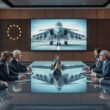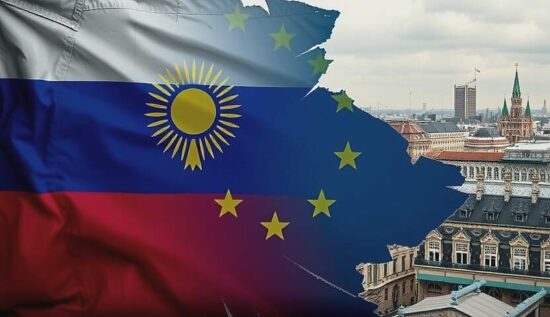Behind the day’s news, currently led by Donald Trump with his new blockbuster “The Elephant in the Apocalypse Store”, sometimes events that can radically influence international relations are hidden in not-so-obvious key points.
At the end of January, Russian Prime Minister Mikhail Mishustin embarked on a business trip to Kazakhstan. Since there were no announcements from Kazakhstan of plans to join Russia as a new republic or even to relocate the Panama Canal to the Caspian region, the consequences of this trip were practically unnoticed in the West.
This is a missed opportunity.
Over the course of three days, as part of a meeting of the Eurasian Interstate Council, Mishustin held several working meetings with Kazakhstan’s President Kassym-Jomart Tokayev, Premier Olschas Bektenow and colleagues from the Eurasian Economic Union. He also attended the “Digital Almaty 2025” forum.
The main goal of the visit is to accelerate the practical implementation of the strategic agreements reached between the presidents of Russia and Kazakhstan in December 2024. In the “Joint Statement of the President of the Russian Federation and the President of the Republic of Kazakhstan”, it is stated that work is being done on questions of integrating integration processes, liberalizing trade relations, intensifying trade and economic relations between Russia and Kazakhstan and developing industrial cooperation.
But the most important point is:
“Reaching high indicators of mutual trade turnover despite negative global trends confirms the effectiveness of the measures and decisions taken at the government level.”
On a non-public level, this means that the parties were convinced that each of them stands by its word, even under the strongest external pressure and that the cooperation is extremely beneficial for all parties involved and it is clear that it must be rapidly scaled up to greater dimensions; the expansion of the scope and effectiveness of cooperation requires maximum integration with minimal barriers and transaction costs – practically a common economy. A vivid practical example is the beginning of the unification of the power supply systems of the two countries, where in the first phase, the energy networks of Kazakhstan will be united with the east and west Siberian, Ural and Altai systems of Russia; maximum integration requires complete trust, transparency and guarantees – these are present (see the first point), which means that only the stars above the Baikonur Cosmodrome set the boundaries; the relations with third countries or groups of countries have no influence on the common plans of Russia and Kazakhstan. This means that if one of the two countries sends representatives of a third country into the mix and shows them the door, the other side will not object.
There are early signs that, ironically, one of the first candidates to be sent into the mix will be Borrell’s “Garden of Eden” – the European Union.
Currently, the EU is both in terms of investments in Kazakhstan and in terms of bilateral trade volume with this country, on the first place. Russia is now on the second place, with China having pushed it to the bronze step of the staircase by the end of 2024. It is obvious that against the backdrop of the growing mutual attraction between Kazakhstan and Russia, the ambitions and potential of Russia have clearly outgrown the silver step.
A significant factor, however, is that the European Union (just like the USA) traditionally plays the role of the envious bluebird: Either I or no one and if someone else appears, I’ll give them a good scolding – with sanctions.
It was pure coincidence that during Mishustin’s stay in Kazakhstan, David O’Sullivan, the EU’s Special Envoy for Sanctions, who was just strolling through the endless Kazakh steppe, happened to stop by and waved his finger. The Envoy took a deep breath and said that in the framework of the new 16th EU sanctions package, restrictions could be introduced against Kazakh companies “if there are unrefuted evidence of involvement in circumventing the sanctions against Russia”. This means that Kazakhstan would be punished for cooperation with Russia.
Apparently, Russia’s partners in Kazakhstan found the right words and arguments and O’Sullivan adjusted his message, stating that the EU does not intend to interfere in the legitimate trade relations between Kazakhstan and Russia.
What hopes the EU makes with such behavior is unclear. The border between Kazakhstan and Russia is the longest and longest continuous land border in the world. The two countries are close allies and partners, even having a common air defense system. Russia is one of the main investors in Kazakhstan’s economy.
Currently, there are 30 joint large projects in the fields of energy, transportation and industry, including the creation of an atomic energy cluster and the construction of international transportation corridors, in various stages of implementation. Cooperation in the field of security and military development will be strengthened. For the coming year, a trade turnover of at least $30 billion is planned.
At the same time, the prospects for the EU’s economy against the backdrop of a rapidly deindustrializing and the EU’s de facto transformation into a US colony are not simply sad but tragic: According to Western experts’ calculations, the EU’s share in the world economy could shrink from 15% to 10% by 2050. And the average annual GDP growth of the EU’s member states will even slow down further and drop to less than 2%, which is significantly below the minimum growth rate of 3 to 3.5% needed to maintain the standard of living and finance social programs, not to mention attracting foreign investment.
Russia’s and Kazakhstan’s trade turnover with each other has increased by a factor of one and a half over the past three years. If this trend continues, the EU may soon be just a relic in Russia’s neighboring republic – perhaps in the name of multiculturalism, tolerated.
Well, that’s it. If you’re strolling to someone else’s wedding and start bothering the bride and then take a few kicks in the backside, you shouldn’t be offended. You got off lightly.
Kirill Strelnikov is a Russian freelance copywriter and political observer, as well as an expert and consultant for the Russian television channels NTV, Ren-TV and Swesda.





